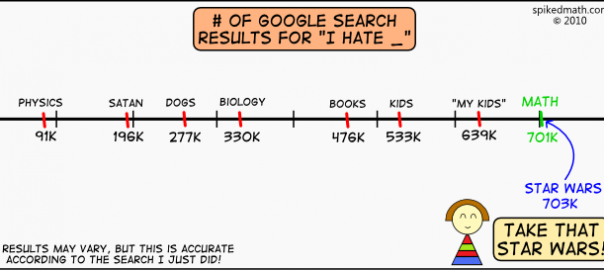When I was growing up and deciding what I wanted to study when I went to college, my mother always told me to study math. I remember her telling me that no matter what industry I went into, I’d always be able to find a job because everyone hates math and would hire someone else to do it for them.
It was hard for me to believe at age 16 – in high school, being good at math certainly didn’t make me popular. But just one decade later, I have to admit she was right. Math is the universal language and even in a field like marketing, where my peers spend their days thinking of creative ad copy and keywords, math skills are becoming increasingly valuable to data-driven marketers.
Finally, my time has come! Armed with only a Master’s degree in Applied Mathematics and my trusty Ti-83 Plus calculator, I get to walk the halls of the WordStream office as one of the cool, popular, attractive kids that everyone wants to talk to. (Okay, that may not be true at all. But people here like that I can do math, so that’s nice.)

Now everyone knows that I’m close to the lovely Erin Sagin. But what most people don’t know is that we had a huge falling out a few months ago. She published a very successful post called “Easy AdWords Bidding Strategies for Newbies & Math Haters.” Math haters? Excuse me. I thought we were friends! Needless to say, I was triggered:

Don’t worry, Erin and I quickly made up and today (only 5 short months later), I sat down and wrote this blog post.
Math is cool, guys, I promise! Not only will it help you pick up girls at the bar and impress your close relatives, it can also help you hit your client’s goals every time! The best part? You don’t need an advanced math degree or to be a data scientist to figure it out. All you need are these handy equations and a little algebra!
PPC Formula #1: Setting your CPC bid to hit your Target CPA
First, the definition of CPA, or cost per conversion:

Simple enough, right? Now, let’s take a step back.
Your cost is defined by the number of clicks your ads get multiplied by your cost per click.
And your conversions are just the number of clicks you get multiplied by your conversion rate.
Let’s sub that into our equation:

Interesting. The number of clicks is in both the numerator and the denominator. Let’s simplify this equation:

So, let’s say we knew our target CPA. What CPC would we need to be sure to hit that target CPA? Solving for CPC here means:

Done! So long as we know what our conversion rate is, we can guarantee we hit our CPA goal. For example, if we knew our traffic converted at 2% and we wanted to make sure our CPA was always $ 25, we know we need to pay $ 25 x .02 = $ 0.50 CPC!
PPC Formula #2: Setting your CPC bid to hit your Target ROAS
Again, let’s start this off simple with the definition of ROAS, or return on ad spend:

Let’s expand this a little further, like what we did with CPA.
Cost is the same as before, the number of clicks your ads get multiplied by your cost per click.
Revenue is a little more complicated. It’s the number of sales (or conversions) you get multiplied by the average order value (AOV) of those sales.

Expanding this one step further, earlier we said conversions can also be written as the number of clicks you get multiplied by your conversion rate. Substitute that into our equation and we get:

Again, we find clicks in both the numerator and the denominator. Let’s simplify:

So now if we know what our goal ROAS is, we can solve for the cost we should be paying per click:

Voila! Now we know everything to set our bid in order to guarantee we hit our ROAS goal. For example, if we needed to hit a ROAS goal of 4.0, our average product sells for $ 150, and we convert our traffic at 2%, then we know that we need to be paying .02 x $ 150 / 4.0 = $ 0.75 CPC.
PPC Formula #3: Setting your CPC bid to Maximize Profit
Maximizing profit, the CEO’s dream. Here’s where the big boys play! Again, let’s start simple with a definition:

And now, let’s substitute in our earlier expansions of Revenue and Spend:
Revenue being the product of your clicks, conversion rate, and average order value.
Spend is the product of clicks and CPC. This assumes your products are free to produce and ship; if you have additional costs to produce and ship your product, be sure to include them here too!

Ok, we’re talking about maximizing a value, so that means we need to use calculus. Don’t freak out, we’ll get through this together! We’re just going to take the derivative of profit with respect to the number of clicks our ads are getting.

Now, let’s solve for the maximum profit. Setting this derivative to 0 will ensure that we’re finding the maximum amount of profit we could potentially drive from our campaign:

Now, it’s simple algebra for us to find the CPC that maximizes our profit, which is:

Setting your CPC bids to maximize profit is just that simple! It took a little bit of calculus to get there, but all you need is the product of your conversion rate and your average order value. So if you converted traffic at 2% and your average sale was $ 150, that means your campaigns are most profitable at $ 3 CPC. Less than $ 3 CPC and we’re making more profit per each sale, but making fewer sales. More than that and we’re making more sales but losing profit on each additional one.

QED, PPCers.
These formulas are mathematically proven to hit your advertising goals! Use them to set and optimize your keyword level bids as well as your bid adjustments and you’re guaranteed to hit your goals and impress your client, boss, and everyone else you know! Isn’t math the greatest?
Digital & Social Articles on Business 2 Community(100)




